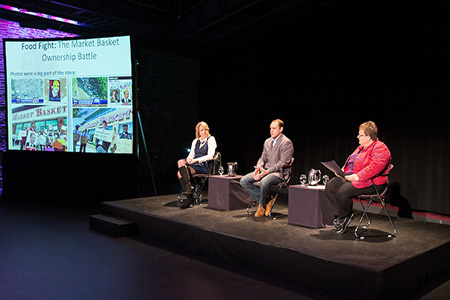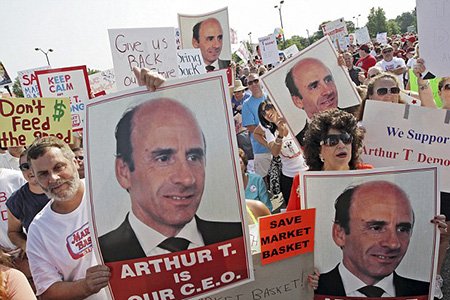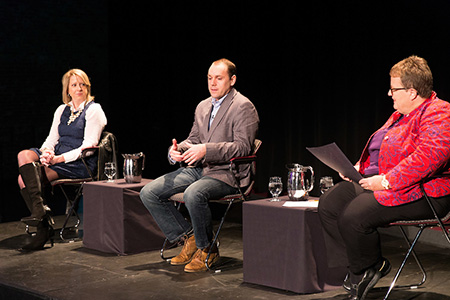Reporter, publicist talk Market Basket

Publicist Justine Griffin, reporter Casey Ross, and Marketing Communication faculty member Brenda Wrigley discuss how the summer’s Market Basket crisis was handled in the media. (Photo by Michelle Kwong ’15)
A Boston Globe reporter and a publicist for Market Basket chief executive officer Arthur T. Demoulas participated in a discussion October 20 about the public relations crisis that rocked the New England supermarket chain Market Basket over the summer.
Casey Ross covered the story as a business reporter for the Boston Globe and Justine Griffin, managing director for Rasky Baerlein Strategic Communications, represented Demoulas, and the pair interacted often during the discussion. Brenda Wrigley, associate professor in Marketing Communication, moderated the discussion, which was held in the Jackie Liebergott Black Box Theatre in the Paramount Center.
Market Basket made headlines over the summer when company workers led a two-month-long protest due to the ousting of chief executive officer Arthur T. Demoulas. The firing was the result of a decades-long family feud between cousins Arthur T. Demoulas and Arthur S. Demoulas, who both were major shareholders in the company, which has experienced steady growth in recent years.
The ousting of Arthur T. Demoulas led to the firing of several high-level managers who expressed outrage at Arthur T.’s departure, and thousands of employees temporarily walked off the job. Arthur T., as he is called, and the managers got their jobs back when the protests ended in August.

Ross and Griffin discussed the intensity of monitoring a major story that nearly resulted in the collapse of a large company.
“It was very complex,” said Ross. “There is a lot of history there, which you have to look at and report on and you have to understand it.”
As a reporter, Ross said coverage for the protests was time consuming.
“I was trying to dig up exclusive material on a daily basis,” he said.

Griffin, Ross, and Wrigley. (Photo by Michelle Kwong ’15)
Griffin, the publicist, said she had to form honest relationships with the reporters, including Ross, who covered the story.
“[Casey] and I had the joint mission that what he was reporting was right,” said Griffin.
Due to the high profile nature of the story, Griffin said rumors were rampant.
“I’d prefer most of the time that he wasn’t reporting. But if he was going to report, [I wanted] it right,” she said.
Griffin explained that there were times when she could not tell Ross much of anything, but would allow him to run information by her to judge whether it was accurate.
Following the panel discussion, the pair met with Emerson students to talk more about how publicists work with journalists when major crises unfold.
The event was organized by Emerson’s Office of Communications and Marketing.
Categories